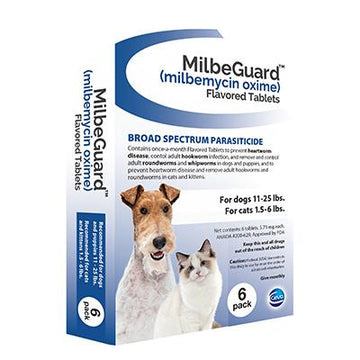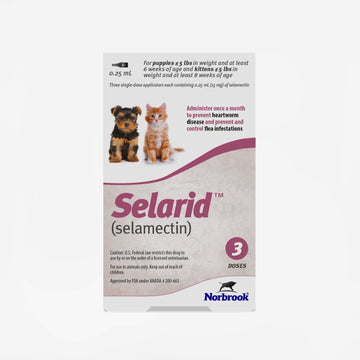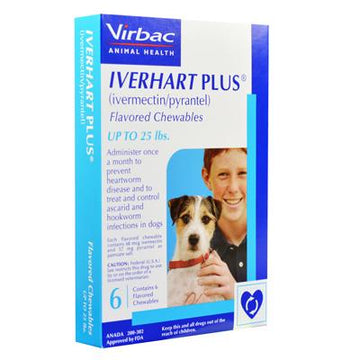Dog Dewormers
-

MilbeGuard Flavored Tablet (Rx)
$28.59 / unit
Multiple options available
-

Selarid for Puppies & Kittens - 3 months (Rx)
$36.05 / unit
20% off for a limited time Use code FLEATICK20 -
Prescriptions without the expensive vet trip
Video chat with a vet and get new prescriptions and renewals — shipped free to you.

-

Iverhart Plus (Rx)
$28.26 / unit
Multiple options available
-

Iverhart Max Chew (Rx)
$46.26 / unit
Multiple options available
-

Parasedge Multi TOPICAL SOLN for Dogs (Rx)
$47.46 / unit
20% off for a limited time Use code FLEATICK20Multiple options available
-

Senergy Canine Topical Solution (Rx)
$47.94 / unit
20% off for a limited time Use code FLEATICK20Multiple options available
-

Senergy Puppy/Kitten Topical Solution (Rx)
$42.83 / unit
20% off for a limited time Use code FLEATICK20
- 1
- 2
Frequently asked questions
What are the signs of worms in dogs?
What are the signs of worms in dogs?
Detecting the signs of worms in dogs ensures timely treatment and prevents potential health issues. Here are some symptoms to watch for:
- Changes in stool: Diarrhea, loose stools, presence of blood or mucus, or visible worm segments in the stool indicate the presence of parasites.
- Weight loss: Unexplained weight loss or stunted growth in puppies may be due to worms.
- Abdominal discomfort: Worms in dogs can present as a swollen or distended abdomen or a “potbelly” appearance. Abdominal pain or discomfort is also common.
- Lethargy: Reduced energy levels or a reluctance to engage in usual activities or play may indicate worms.
If you notice any of these signs or symptoms in your dog, consult a vet as soon as possible. A vet can perform diagnostic tests to identify the type of worms present and recommend the best treatment to eliminate the infestation and restore your dog’s health. Regular deworming and preventive measures can help protect your dog from future infestations and maintain their well-being.
Unsure if your dog needs to go to the vet? Schedule a consultation with a Dutch vet from your home to discuss your dog’s symptoms. Dutch members get free shipping on pharmacy orders, so you can ensure your dog gets fast, effective, and convenient treatment.
How do you deworm a dog?
How do you deworm a dog?
Deworming a dog involves several steps to effectively eliminate internal parasites and restore their health. The first step is always a consultation with a vet to assess your dog’s health, discuss symptoms and concerns, and recommend the appropriate deworming treatment based on your dog’s age, lifestyle, and medical history.
Your vet may also recommend diagnostic tests, such as fecal examinations, to identify the type of worms present in your dog’s system. This information can help them determine the best deworming protocol.
Based on the diagnostic results, your vet will provide guidance on the appropriate deworming medication for your dog. Dewormers are available in various forms, including oral tablets, liquids, or topical treatments.
Follow the instructions carefully and ensure your dog receives the full course of treatment. Some dewormers may require multiple doses over several days or weeks to eliminate all stages of the parasites.
What is the best dog dewormer?
What is the best dog dewormer?
Different deworming medicines for dogs may target specific types of parasites, such as roundworms, whipworms, hookworms, or tapeworms. The best dewormer for dogs may depend on the type of parasites they have.
Dewormers for dogs come in various formulations, so you should always consider your dog’s preferences and ease of administration when selecting a formulation. Some dogs may prefer chewable tablets, while others may find liquid formulations easier to administer.
Keep in mind that the best treatment for worms in dogs is often prevention. If your dog doesn’t have worms, you might try a product like Sentinel for Dogs to provide ongoing protection against common intestinal parasites.
Talk to your vet about comprehensive coverage. Many dewormers provide coverage against multiple types of parasites, which can be particularly beneficial if your dog is at risk of contracting different worm species.
Some dewormers offer broad-spectrum protection against a wide range of intestinal parasites, providing peace of mind for pet parents. Your vet can help you find everything from the best dewormer for dogs without a vet prescription, like Panacur C, to the most suitable preventive medications for ongoing protection.
Explore our online pet pharmacy to find more great dog health products that support your pup’s well-being.
How often should you deworm your dog?
How often should you deworm your dog?
In general, puppies are commonly dewormed starting at a young age and continuing every few weeks until they’re around eight weeks old. After this initial deworming series, puppies may be dewormed monthly until they reach about six months of age to ensure comprehensive protection against intestinal parasites during their growth and development stages.
Once dogs reach adulthood, deworming frequency is typically based on their needs and risk of exposure to parasites. Dogs with minimal outdoor exposure may only require deworming every few months, while those with higher exposure to potential sources of parasites may benefit from more frequent deworming.
Consult your vet to develop a deworming schedule tailored to your dog’s specific needs.







